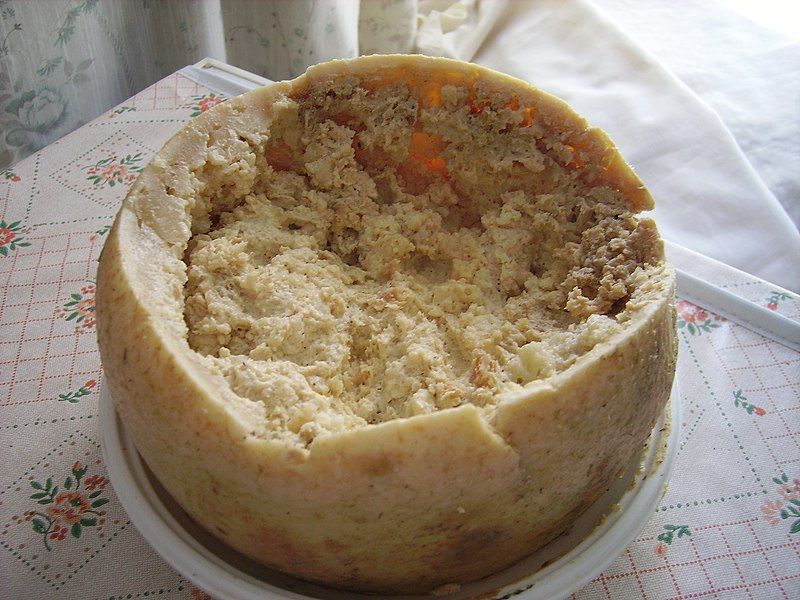The casu marzu or casu martzu is a sheep cheese from Sardinia, in Italy. This cheese is famous for being the ‘maggot cheese’ or ‘grub cheese’. At first sight, it doesn’t look tasty, it is however widely talked about all over the world. People are very curious about it, and we understand them. A dangerous cheese? An untraceable cheese? A banned cheese? Find out all about the maggot cheese!
Casu marzu: rotten cheese?

The first question that comes to mind is: Is casu marzu really ‘rotten’?
If you were to take a microscope and analyze a cheese from the inside, you would see that it is indeed a ‘living’ product. Actually, for the affinage of a cheese, a multitude of microorganisms are at work: cheese is alive. We could describe the living beings in the cheese one by one, but it would be too long.
However, in the case of this Italian cheese, the ‘living’ aspect can be seen with the bare eye. You no longer need a microscope! So, yes. The casu marzu does contain maggots inside, which are used for its affinage.
In the first place, it is pecorino that has been filled with larvae of the cheese fly (Piophila casei) which, through its digestive action, brings the cheese to the final stage of fermentation: the flowing one.
Is casu marzu dangerous?
This cheese with maggots is forbidden to be sold not only in the US, but also in the entire European Union. In fact, it is considered potentially dangerous to health.
The larvae present in the cheese can, when disturbed, jump up to 15 cm. This cheese is considered potentially dangerous to health because if the ingested maggots are not destroyed by the gastric juices (acid),they can cause very serious lesions in the intestines.
If this cheese is still made by hand, it is so strong that those who enjoy it do not make many disciples. Please note that if you cross the road of another cheese that ‘moves by itself’ on the outside of the cheese, this is not normal. This is probably due to a packaging defect (not cool enough, not protected: flies have come to lay eggs).
Is it possible to find casu marzu somewhere on earth?
Let’s be clear, we will never encourage you to put yourself in danger. Regarding the potential dangers involved, we recommend you keep your distance from this cheese. However, if your curiosity is stronger than your fear, be aware that this cheese does exist somewhere. Actually, you could possibly see it and smell it in Corsica (French island) or in Sardinia (Italian island), but you will have to look for it. Please note that we do not recommend that you eat it.
What does the rotten cheese from Sardinia taste like?
Have we piqued your curiosity? Would you like to know what this sheep cheese affined with larvae tastes like? Well, according to our experts, the taste of casu marzu is close to the ‘strong cheese’ of Lyon (a big city in France), but stronger because it is a sheep cheese…
Some people describe it as ‘spicy’ or ‘hot’. Its smell appears to be very strong, very persistent.
How is this rotten cheese made?
Want to know how this particular and controversial cheese from Italy is made?
Production of casu marzu step by step
This formaggio (‘cheese’ in Italian) is made from sheep milk that is boiled at 35°C. Once the rennet is added, the liquid begins to coagulate. It takes about 25 minutes before obtaining curdled milk. Then, this milk is put into molds, and 24 hours later, into the brine. The cheese is then left in the open air, which explains why flies come and lay eggs inside. The affinage lasts a minimum of 15 days to obtain a creamy casu marzu, as aficionados in Sardinia or Corsica like it.
Has casu marzu ever caused anyone’s death?
According to various experts who have alerted consumers, casu marzu and its living larvae can cause many dangerous symptoms. When settling into the intestines, the maggots can eventually create painful and dangerous lesions. Here are some of the symptoms we can feel after eating this maggot cheese:
- nausea,
- vomiting attacks,
- acute abdominal pain,
- bloody diarrhea.
As far as we know, the casu martzu never caused anyone’s death. However, it is difficult to be syre, as this cheese dates back to ancient times.
Ok, not sure if you want to add this cheese to your Christmas cheese platter, but casu marzu deserved to be considered. If you have already had the opportunity to cross its road, smell it or even taste it, please tell us about it in the comments. We would love to chat with you and learn from your experience!









